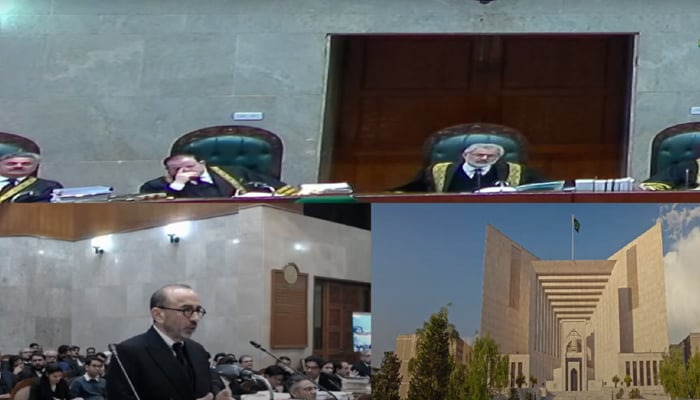CJP Isa sees Bhutto reference as opportunity for judiciary, army to restore reputation
Justice Mansoor Ali Shah says Supreme Court cannot examine merit of case since verdict had already announced
February 20, 2024

- Bilawal Bhutto, amicus curiae attend today’s top court hearing.
- Interviews of ex-judges proved biases of judges: Makhdoom Khan.
- “Even cat cannot be awarded death penalty based on the evidence.”
ISLAMABAD: Chief Justice of Pakistan (CJP) Qazi Faez Isa has wondered whether the Zulfikar Ali Bhutto reference is an opportunity for the Supreme Court and armed forces to rectify their past mistakes and restore their reputation.
“Isn't this an opportunity for both institutions to get rid of the accusations hurled against them,” the top judge remarked on Tuesday during a hearing of a presidential reference related to the death sentence awarded to the former PM Bhutto in 1979.
The apex court larger bench — led by CJP Isa and comprising Justice Sardar Tariq Masood, Justice Syed Mansoor Ali Shah, Justice Yahya Afridi, Justice Amin-ud-Din Khan, Justice Jamal Khan Mandokhel, Justice Muhammad Ali Mazhar, Justice Syed Hasan Azhar Rizvi and Justice Musarrat Hilali — heard the presidential reference seeking to revisit the “controversial” death sentence awarded to former PM Bhutto in 1979.
PPP Chairman Bilawal Bhutto-Zardari and amicus curiae with expertise on the criminal and constitutional sides attended today’s hearing.
CJP Isa also said that imposing martial law is a decision of an individual and not of an institution of the army.
“Isn’t the verdict in the Bhutto reference draw a line for the judiciary and the army,” he added.
The Supreme Court also decided to hear the heirs of the late PPP founder and complainant Ahmad Raza Kasuri in the presidential reference.
CJP Isa directed all respondents to keep their arguments short and said that the top court wanted to conclude the hearing of the case before the retirement of a judge part of the larger bench.
Amicus Curiae Makhdoom Ali Khan told the bench that the interviews of former judges Naseem Hassan Shah, Dorab Patel, and Aslam Riaz were on record to prove the biases of the judges who awarded capital punishment to the PPP founder.
He said former judge Qaiser Rashid Khan had said that “even a cat cannot be awarded death penalty based on the evidence” present in the ZA Bhutto case.
Khan also said that the court can announce the verdict in the ZA Bhutto case under Article 187.
During the hearing, Justice Shah remarked that the court could not examine the merit of the case since the verdict had already been announced.
However, the court can look into how the former PM was sentenced to death.
“If the court has to ascertain whether the judges announced the verdict under duress then what would be the evidence [to back the claim],” he remarked.
The hearing of the case has been adjourned till February 26.
In its written order of today’s proceedings, the Supreme Court said amicus curiae Khalid Javed Khan has submitted his response to the court, while the PPP chief’s counsel Farooq H Naek, Raza Rabbani and Zahid Ibrahim will present their arguments after amicus curies.
Bhutto was hanged to death on April 4, 1979, in the Rawalpindi district jail in a murder case. His party, however, termed the capital punishment to Bhutto as “judicial murder”.
Former president Asif Ali Zardari, on April 2, 2011, approached the apex court through a presidential reference under Article 186 of the Constitution to seek its opinion on revisiting the trial of the PPP founder.
On December 12 last year, the larger bench, while hearing the matter, had appointed amicus curiae with expertise on the criminal and constitutional sides, seeking their assistance, particularly on the matter of maintainability of the instant reference, pending with the court for 11 years.











